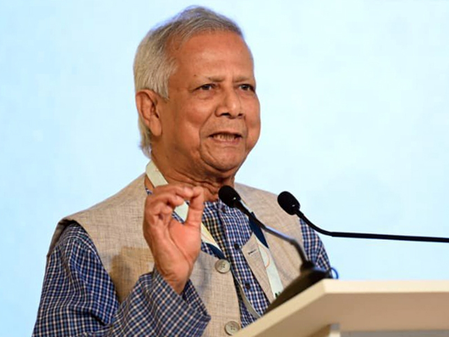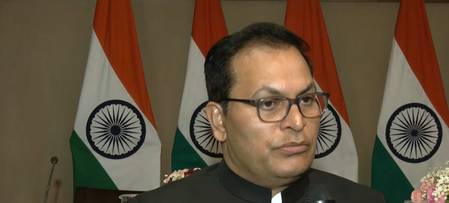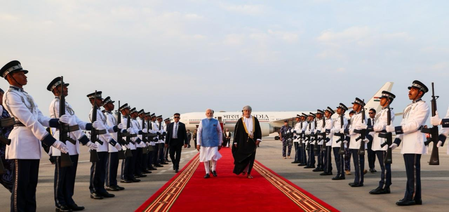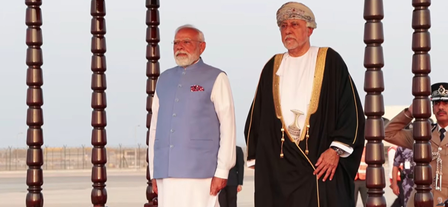
Islamabad, May 20 (IANS) In an unprecedented move after India’s hard-hitting Operation Sindoor targetting the terror infrastructure deep inside Pakistan post Pahalgam massacre, the Pakistan Cabinet chaired by Prime Minister Shehbaz Sharif on Tuesday announced its decision to promote the Chief of Army Staff (COAS) General Asim Munir to the rank of Field Marshal.
“The government approved the promotion of COAS General Munir to the rank of Field Marshal for ensuring the security of the country and defeating the enemy via best strategy and courageous leadership during ‘Operation Bunyan-um-Marsoos’,” Geo News reported, adding that General Munir has been rewarded for his “brilliant military leadership, bravery, and commitment to defending Pakistan’s sovereignty and territorial integrity”.
The 11th Army Chief of Pakistan, General Munir, 57, will become only the second five-star field officer in the country’s 78-year-old history. The only Field Marshal in Pakistan so far was military ruler, Ayub Khan, who promoted himself to the top rank in 1959, soon after seizing power.
Even as Munir was busy expressing “gratitude to Allah” and dedicating his honour to the nation, Tuesday’s decision was being ridiculed even inside Pakistan as it is for the first time an Army General has been promoted after losing in a conflict.
With Pakistan being a de facto military State, several analysts reckoned that it was Munir who “promoted himself” to Field Marshal after the humiliating defeat in Operation Sindoor.
Other experts emphasised that Munir is doubling down on his narrative of victory and by elevating his position, tightening his grip and control on Pakistan.
“Musharraf 2.0 loading!” wrote a former Army officer on social media.
Like his Field Marshal predecessor Ayub Khan, Munir too has a jaundiced view of Indian military strength, which was comprehensively belied for both in Indian-Pakistan conflicts – the 1965 war for the late President and Operation Sindoor for Munir.
The government led by Shehbaz Sharif also decided to extend the tenure of Air Chief Marshal Zaheer Ahmad Babar Sidhu, “recognising his services and leadership during the recent conflict”, Samaa News reported.
Interestingly, the entire world had acknowledged the military superiority demonstrated by India during Operation Sindoor, showcasing the capability to strike “any target in Pakistan at will”, including terror sites, drone coordination hubs, and airbases.
In contrast, Pakistan was unable to penetrate any defended area inside India.
India’s Operation Sindoor marked a significant shift in its military strategy, leading to a swift and decisive victory over Pakistan with even renowned international analysts such as Tom Cooper, John Spencer and Jennifer Zeng providing detailed assessments of India’s performance during this conflict, highlighting the strategic and tactical elements that contributed to India’s success.
Austrian military historian Tom Cooper characterised India’s air campaign as a “clear-cut victory.” Cooper noted that Pakistan’s inability to mount a credible response underscored the effectiveness of India’s strategy. Cooper further supports this by noting the failure of Pakistan’s deterrence strategy. Pakistan’s reliance on threats of retaliation and nuclear escalation “failed” because India proceeded to strike back and even escalated in response to Pakistan’s actions. He also points out that the fighting ceased because Islamabad, Pakistan, initiated contact to sound for a “ceasefire” after suffering heavy losses. He suggests that Pakistan’s decision to halt operations was likely influenced by insufficient stocks of effective ammunition, such as attack UAVs.
John Spencer, Chair of Urban Warfare Studies at the Modern War Institute, lauded India’s approach as a demonstration of strategic restraint and assertiveness. He highlighted that Operation Sindoor redefined India’s red lines, treating terror attacks from Pakistani territory as acts of war. Spencer remarked, “India struck back harder, but stopped short of general war. That is textbook deterrence: calibrated, controlled, and credible.” Spencer characterises Operation Sindoor as a “massive victory” for India. He argues that India achieved and “exceeded its strategic aims” in just four days of calibrated military action. Spencer views this as the application of “decisive power, clearly applied”, not just symbolic force.
–IANS
int/vd/as




